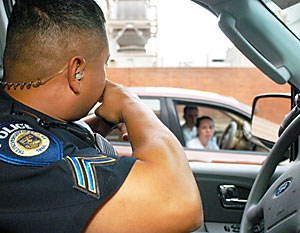 |
|
JOSH FIELDS/Arizona Summer Wildcat
|
UAPD officer David Caballero conducts a traffic violation stop on East Fifth Street. UAPD has a constant presence on campus and is charged with making the university a safer place by protecting property and monitoring safety. ��
|
|
|
By Holly Wells
Arizona Daily Wildcat
Wednesday, July 27, 2005
Print this
The University of Arizona Police Department made 374 liquor violation arrests and 246 drug violation arrests in 2004.
During the last school year, Residence Life handled 600 alcohol violations and 81 drug and paraphernalia violations.
Residence Life often handles these violations internally and UAPD is not called unless staff members feel uncomfortable, said Jim Van Arsdel, director of Residence Life.
Coronado Residence Hall topped the list with the most alcohol violations at 138.
Van Arsdel said Coronado is frequently the leading offender, but also said Coronado has twice as many students as most dorms.
History junior Natalie Parker said she lived in Coronado her freshman year and saw a lot of arrests.
Parker said she always notices a UAPD presence at parties and other social activities.
Sergeant Eugene Mejia, UAPD spokesman, said the arrests are due to new freshmen not knowing the rules or just thinking they won't get caught.
Incoming freshmen are adjusting to a different environment and need to be responsible, he said.
Mejia said UAPD can't make students stay out of trouble, but said it does inform them of the consequences.
"Consuming alcohol when you're under 21 is against the law. Doing drugs is against the law. The simplest way to avoid a confrontation with police is to stay away from these activities," he said.
Many students may choose to travel to Mexico, where they can drink legally at age 18 and circumvent U.S. law.
Police suggest students take extra precautions when leaving the country. Students should travel in large groups and have a designated driver.
If a student chooses to act illegally in his or her residence hall, it's likely he or she will get caught, Mejia said.
"We always tell students at orientation that if they smoke marijuana in the dorm then there is no way to mask the smell. Marijuana smells like marijuana and you will get caught," he said.
If a student is found with drugs or alcohol by UAPD, they are likely to face a diversion program for a first offense, including mandatory community service hours and any fines associated with the incident.
The student's parents may also be informed about the incident.
Laws allow the university to contact parents and provide limited notification of the incident.
"Parents need to know there is a potential problem," Mejia said. "We expect students and staff to be successful and they need support along the way."
Residence Life handles drug and alcohol violations in its own way.
The first time a student is caught with alcohol he or she is asked to pour it out and required to attend a SHADE class to learn about the effects of alcohol on the body. The program includes a $25 fine and probation.
On the second offense, the resident must complete an educational assignment determined by the hall director and eviction is deferred.
A third offense results in eviction and if a student is found with drugs, he or she is automatically evicted.
But, if the student is only found with paraphernalia he or she is usually not evicted unless there is residue, and is instead put on probation.
Marcos Martinez, elementary education junior, said even when students are informed of the penalties, they are unlikely to stop illegal activities.
"I lived in the stadium dorm and there was a lot of freshmen that partied," he said.
Martinez said drinking seems like normal freshman behavior.
Mejia said students should not think of police as the bad guys.
"We're here to keep students safe by enforcing the law," he said.
Mejia said statistics show the propensity for violent crime increases when drugs or alcohol are used.
Last year's violent crime numbers were low, but Mejia said they would be much higher if police did not pay attention to alcohol and drug use.
Mejia said after alcohol and drug use, theft is the biggest problem on campus.
The risk of theft can be greatly reduced if students just pay attention, he said.
Many students leave their belongings unattended on campus, giving criminals the opportunity to easily snatch them.
Bike theft is also a big issue on campus. Mejia said perpetrators are usually stealing bikes so they can sell them for drugs.
Through a partnership with Master Lock, UAPD sells bike locks for $13 and steering wheel locks for $10.
Mejia said students help keep the campus safe by reporting things that seem out of the ordinary and thereby possibly preventing crimes from happening. ��
